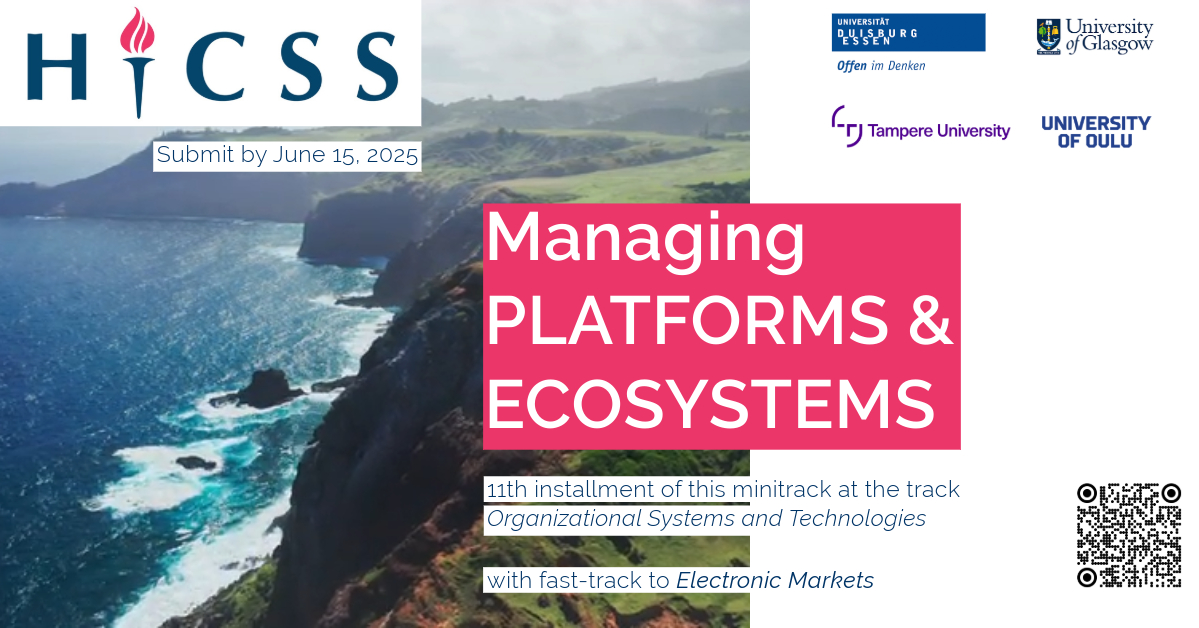Managing PLATFORMS & ECOSYSTEMS (HICSS Minitrack)
HICSS-59: Managing PLATFORMS & ECOSYSTEMS

We are delighted to invite papers and participation to our HICSS-59 minitrack on Managing Platforms & Ecosystems’. The minitrack marks the eleventh installation of successful exploration of platforms and ecosystems since HICSS-49 (see Russell et al. 2021).
Understanding modern-day competition and the survival of organizations oftentimes requires an ecosystem lens. This is because digital technologies have enabled new complementarities between actors within and across industries (e.g., Cusumano et al. 2019, Constantinides et al. 2018). The increasing platformization of firms and technologies has important implications in how companies create and capture value. In this new “digital first” economy (Baskerville et al. 2020), transaction and innovation platforms have become dominant forms of organization (Gawer 2021, de Reuver et al. 2018, van Dijck 2018). As scholars interested in platforms and ecosystems, we…
(1) face new phenomena,
providing insights from (2) new empirics,
that might (3) require new methods,
and (4) new theories.
In general, the minitrack seeks contributions that problematize or build on diverse theoretical backgrounds such as management science, information systems, computer science, decision science, system science, organizational design, policy making, and behavioural economics to continue the scholarly exploration of concepts, theories, models, and tools for managing platforms and ecosystems. We are open to a wide set of methodological approaches, including empirical research, case-based research, field studies, design science, behavioural decision-making experiments, and conceptual research. This year, we are also happy to provide a fast-track for selected papers to Electronic Markets.
In the following, we provide exemplary provocations for research at the intersections of platforms and ecosystems that provide first glances into the research of interest to this minitrack.
Platforms & Ecosystems + Data, Analytics, and AI:
In the past decade(s), platform research has introduced important mechanisms for explaining platform emergence and growth, such as network externalities (e.g., Eisenmann et al. 2011; Karhu and Ritala, 2021), generativity (e.g., Furstenau et al., 2023), or legitimization (Taeuscher and Rothe, 2021). Beyond traditional views on the growth of users, complementors, and firm size, platform providers collect more and more data (Aaltonen et al. 2020) to produce superior machine learning and AI applications. At the same time, ML and AI applications produce new data to provide growth of platforms (Gregory et al. 2021). Large language model platforms such as (Chat)GPT indicate a shift from producing value through matching complementors and users to learning how to produce content and services from data over time. Data has become a vital resource and decentralized infrastructures such as the emerging data spaces (Beverungen et al. 2022, Otto and Jarke 2019) might challenge current forms of organizing ecosystems via polycentric platforms (Pujadas et al. 2024) where data and rights to use data are shared under new terms.
Platforms & Ecosystems + Global Grand Challenges:
As we reached the halftime mark of UN Agenda 2030, demand and supply sides are increasingly concerned about their impact on the 17 sustainable development goals. None of these challenges can be solved by single actors (Waddock et al., 2015). Instead, they involve many actors across organizations and beyond the reach of regular organizational control (Kokshagina, 2022). Thus, platform ecosystems are considered tools to address grand challenges (Nambisan & George, 2024; Ritala, 2024) and societal challenges (Addo, 2022). At this point, however, despite exceptions focusing on platforms and development (Bonina et al., 2021), platform theorizing has mostly been concerned with mechanisms explaining economic growth and development rather than digital sustainability, responsibility, or circular economies in ecosystems. This is surprising, considering that platforms play a vital role in sharing and reporting data related to these Grand Challenges (e.g., ESG reporting, digital product passports). This gives platforms a pivotal role in measurements of societal, ecological, and economic impact of market offerings.
Platforms & Ecosystems + Innovation, Policy, and Purpose
Platforms and ecosystems promise accessibility and democratization of value creation and capture by inverting the firm (Parker et al. 2017) or producing new labour markets in a sharing economy (Nian et al. 2021). We have, however, learned that platform providers accumulate power, sometimes leading to the misuse of market dominance (Aral, 2021; Khan, 2019; Gawer, 2022). This is important because platforms and ecosystems affect their environment. Recommendation systems of Instagram, for example, have been perceived as harmful for teenagers, eventually inducing testimonies of leading managers before the US Congress. Peer-to-peer lending platforms affected personal decisions on abortion and women's health (Ozer et al. 2022). Thereby platforms have an impact on important societal issues. Sometimes, however, these impacts are unintended or against initially proclaimed intentions, for instance when crowdfunding platforms fail to tear down socioeconomic barriers (Kim and Hann, 2019).
Platforms & Ecosystems + New Methodological Approaches
We are eager to widen the set of methodological approaches, including empirical research, case-based research, field studies, design science, behavioural decision-making experiments, and conceptual research. At the same time, we acknowledge that with greater availability of usage, process, or environmental data, novel approaches towards computational research (Berente et al. 2019) might allow the creation of insights that are able to unravel micro mechanisms in platforms or shed light on the greater complexities of ecosystems. In addition, new ML capabilities suggest novel avenues for qualitative inquiries.
In summary, we encourage authors to submit their best work on managing platforms and ecosystems to our HICSS minitrack and invite them to engage in collaboration between academia, industry, and policymaking for their research. We thereby welcome submissions from industry and around the world.
In collaboration with the Editorial Board of Electronic Markets (EM), we are proud and happy to provide a fast-track option for selected papers to EM. EM is considered among the leading journals in information systems (impact factor 7.1). The journal is well-known for its research on platforms and ecosystems and thereby provides a perfect fit for submissions to this minitrack.
Bibliography
- Addo, A. (2022). Orchestrating a digital platform ecosystem to address societal challenges: A robust action perspective. Journal of Information Technology, 37(4), 359–386.
- Aral, S. (2021). The Hype Machine: How Social Media Disrupts Our Elections, Our Economy, and Our Health—And How We Must Adapt. Currency.
- Baskerville, R., Myers, M. D., & Yoo, Y. (2020). Digital First: The Ontological Reversal and New Challenges for IS Research. MIS Quarterly, 44(2), 509-523.
- Berente, N., Seidel, S., & Safadi, H. (2019). Research commentary—data-driven computationally intensive theory development. Information Systems Research, 30(1), 50-64.
- Beverungen, D., Hess, T., Köster, A., & Lehrer, C. (2022). From private digital platforms to public data spaces: implications for the digital transformation. Electronic Markets, 32(2), 493-501.
- Bonina, C., Koskinen, K., Eaton, B. and Gawer, A., 2021. Digital platforms for development: Foundations and research agenda. Information Systems Journal, 31(6), 869-902.
- Constantinides, P., Henfridsson, O., & Parker, G. G. (2018). Special Issue Introduction: Platforms and Infrastructures in the Digital Age. Information Systems Research, 29(2), 381-400.
- Cusumano, M. A., Gawer, A., & Yoffie, D. B. (2019). The business of platforms: Strategy in the age of digital competition, innovation, and power (pp. 1-309). New York: Harper Business.
- de Reuver, M., Sørensen, C., & Basole, R. C. (2018). The digital platform: a research agenda. Journal of Information Technology, 33(2), 124-135.
- Eisenmann, T., Parker, G., & Alstyne, M. V. (2011). Platform envelopment. Strategic Management Journal, 32(12), 1270–1285.
- Fürstenau, D., Baiyere, A., Schewina, K., Schulte-Althoff, M., & Rothe, H. (2023). Extended generativity theory on digital platforms. Information Systems Research, 34(4), 1686-1710.
- Gawer, A. (2021). Digital platforms’ boundaries: The interplay of firm scope, platform sides, and digital interfaces. Long Range Planning, 54(5), 102045.
- Gawer, A. (2022). Digital platforms and ecosystems: remarks on the dominant organizational forms of the digital age. Innovation: Organization and Management, 24(1), 110-124.
- Garud, R., Kumaraswamy, A., Roberts, A., & Xu, L. (2022). Liminal movement by digital platform‐based sharing economy ventures: The case of Uber Technologies. Strategic Management Journal, 43(3), 447-475.
- Gregory, R. W., Henfridsson, O., Kaganer, E., & Kyriakou, H. (2021). The role of artificial intelligence and data network effects for creating user value. Academy of Management Review, 46(3), 534-551.
- Karhu, K., & Ritala, P. (2021). Slicing the cake without baking it: Opportunistic platform entry strategies in digital markets. Long Range Planning, 54(5), 101988.
- Khan, L. M. (2019). The separation of platforms and commerce. Columbia Law Review, 119(4), 973-1098.
- Kim, K., & Hann, I. H. (2019). Crowdfunding and the democratization of access to capital—An illusion? Evidence from housing prices. Information Systems Research, 30(1), 276-290.
- Kokshagina, O. (2022). Open Covid‐19: Organizing an extreme crowdsourcing campaign to tackle grand challenges. R&D Management, 52(2), 206–219.
- Nambisan, S., & George, G. (2024). Digital Approaches to Societal Grand Challenges: Toward a Broader Research Agenda on Managing Global-Local Design Tensions. Information Systems Research, 35(4), 2059–2076.
- Nian, T., Zhu, Y. A., & Gurbaxani, V. (2021). The Impact of the Sharing Economy on Household Bankruptcy. MIS Quarterly,, 45(3), 1213-1248.
- Parker, G., Van Alstyne, M., & Jiang, X. (2017). Platform Ecosystems. MIS Quarterly, 41(1), 255-266.
- Otto, B., & Jarke, M. (2019). Designing a multi-sided data platform: findings from the International Data Spaces case. Electronic Markets, 29(4), 561-580.
- Ozer, G. T., Greenwood, B. N., & Gopal, A. (2022). Digital multisided platforms and women’s health: An empirical analysis of peer-to-peer lending and abortion rates. Information Systems Research.
- Pujadas, R., Valderrama, E., & Venters, W. (2024). The value and structuring role of web APIs in digital innovation ecosystems: The case of the online travel ecosystem. Research Policy, 53(2), 104931
- Ritala, P. (2023). Grand challenges and platform ecosystems: Scaling solutions for wicked ecological and societal problems. Journal of Product Innovation Management, jpim.12682.
- Russell, M., Rothe, H., & Huhtamäki, J. (2021). Introduction to the Minitrack on Managing the Dynamics of Platforms and Ecosystems. In Proceedings of the 54th Hawaii International Conference on System Sciences (p. 6109).
- Taeuscher, K., & Rothe, H. (2021). Optimal distinctiveness in platform markets: Leveraging complementors as legitimacy buffers. Strategic Management Journal, 42(2), 435-461.
- Van Dijck, J., Poell, T., & De Waal, M. (2018). The platform society: Public values in a connective world. Oxford University Press.
- Waddock, S., Meszoely, G. M., Waddell, S., & Dentoni, D. (2015). The complexity of wicked problems in large scale change. Journal of Organizational Change, 28(6), 993–1012.
Chairs
Hannes Rothe (primary contact)
University of Duisburg-Essen
hannes.rothe (at) icb.uni-due.de
Vladimir Sobota
University of Glasgow
Vladimir.Sobota (at) glasgow.ac.uk
Jukka Huhtamäki
Tampere University
jukka.huhtamaki (at) tuni.fi
Kaisa Still
University of Oulu
kaisa.still (at) oulu.fi
Advisory Committee
Chair of the Committee:
Rahul C. Basole (Accenture AI, USA)
Members of the Committee:
Amrit Tiwana (University of Georgia, USA)
Annabelle Gawer (University of Surrey)
Brandon Barnett (Intel Corporation, USA)
Carmelo Cennamo (Copenhagen Business School, Denmark)
Carsten Sørensen (London School of Economics, UK)
Daniel Fürstenau (Copenhagen Business School, Denmark)
Geoff Parker (Dartmouth College, USA)
Hyunwoo Park (Seoul National University, Korea)
Jesus Delvalle (Bayer, Germany)
Jianxi Luo (City University of Hong Kong, China)
Jim Spohrer (IBM Corporation, USA)
Karl Täuscher (University of Manchester, UK)
Mark de Reuver (Delft University of Technology, Netherlands)
Marko Seppänen (Tampere University, Finland)
Martha Russell (Stanford University, USA)
Michael Cusumano (Massachusetts Institute of Technology, USA)
Michael Jacobides (London Business School, UK)
Neil Rubens (Transport and Telecommunication Institute, Latvia)
Ola Henfridsson (University of Miami, USA)
Paavo Ritala (LUT University, Finland)
Raul Chao (University of Virginia, USA)
Tero Ojanperä (Silo.AI, Finland)
Timo Ali-Vehmas

